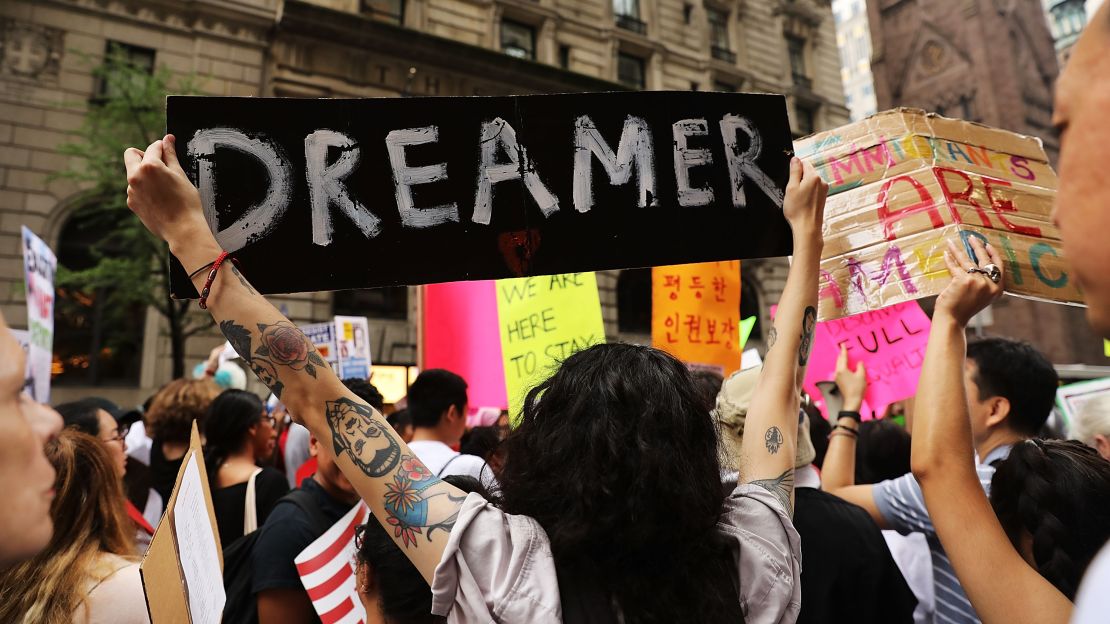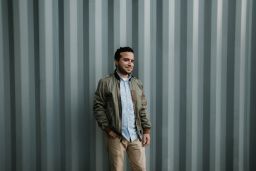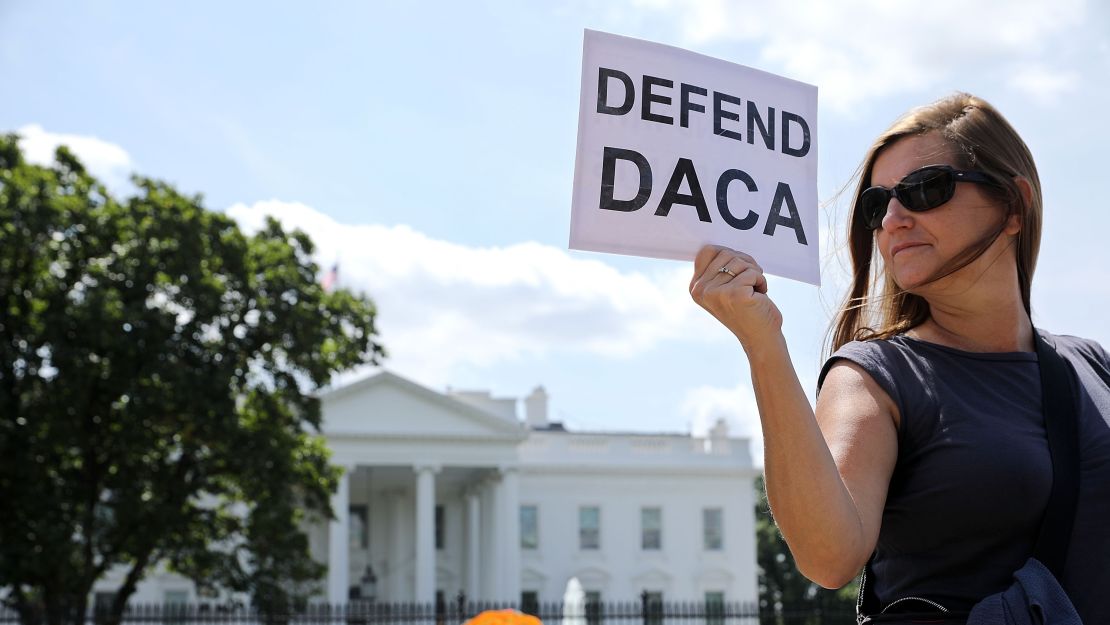Bruna Distinto can’t stop staring at her cell phone.
Sure, she’s a millennial. But the 22-year-old college senior says that’s not why she stays glued to the screen.
“I’m reading the news all the time. It’s almost an obsession,” Distinto says, “because it’s my life at risk.”
Distinto is among nearly 800,000 people who could face deportation if President Donald Trump pulls the plug on a program that protects undocumented immigrants who were brought to the United States as children.
His decision could come as early as this week.

Distinto says she turns to Google like clockwork throughout the day, typing in the four letters that have reshaped her life over the past four years: D-A-C-A.
Lately the headlines have grown increasingly alarming for her and other so-called Dreamers, as word spreads that Trump is weighing whether to phase out the Deferred Action for Childhood Arrivals program.
Created by the Obama administration in 2012, the program gives Dreamers temporary work permits and protects them from deportation if they submit biometric data to the government, pass a background check and maintain a clean record.
Pending Trump immigration action could pressure Hill to act
DACA’s future has been murky ever since Trump took office. As a candidate he vowed to slash it, but he hinted at a softer stance once he made it to the White House, pledging to handle the situation “with heart.” Now the President is said to be weighing his options on DACA as a potential court fight looms.
Immigrant rights groups are on the offensive, holding rallies and pressuring Congress to stand up for the program and pass a more permanent solution. Meanwhile, Dreamers across the United States are bracing themselves for the possibility of losing driver’s licenses, jobs or funding for their educations – and eventually facing deportation to countries many of them barely remember.
Distinto, who came to the United States from Bolivia when she was 6, started her senior year at Trinity Washington University this week. She says it’s hard to focus on her studies with so much stress swirling through her mind.
“If he takes it away, then I have gone to school, I’ve done all this hard work to try to help my family, for nothing, because I wouldn’t be able to work once I graduate next year,” she says. “That’s all I think about.”
‘Are you going to hunt us down?’
Emmanuel Diaz was mowing the lawn at a church in Baxley, Georgia, when he got a text about the Obama administration’s new program back in 2012.
The 17-year-old rushed to show his mother, who brought him to the United States from Colima, Mexico, when he was 2.
“This is it! This is it! This is it!” he told her.
“Don’t get your hopes up,” she replied.
Several months after applying, his DACA acceptance came, and his hope for the future grew.

“I ran to that mailbox like you could not imagine,” he says. “It was better than a little kid at Christmas going to the tree.”
Now 22, he’s a senior at Armstrong State University in Savannah, Georgia, studying business economics and holding down two jobs to make his tuition payments. Without work, he says, he might not be able to finish his degree.
He wonders what will happen next if Trump ends DACA.
“Are you going to hunt us down, one by one?”
As he awaits news of the President’s decision, Diaz says he’s praying for peace.
“I’m just asking that they see us as an asset. … I just hope they see us as people that are trying to get by.”
A graduation reprieve
There’s no doubt that reports of a looming DACA decision have sparked growing anxiety, says Leezia Dhalla, a communications associate at FWD.us, an immigration reform group started by Facebook CEO Mark Zuckerberg and other tech leaders.
“You never know if today is the day. It is emotionally draining to never really know and have a perpetual state of fear,” says Dhalla, who was accepted into DACA in 2012.
Without DACA, the 27-year-old says, every Dreamer could become an immediate priority for deportation.
“Without a work permit, we’re going to be ripped out of the workforce,” she says. “Without a driver’s license, we’re not even going to be able to go to the grocery store.”
But Dhalla says positive comments Trump has made about Dreamers leave her hopeful.

“I’m encouraged that he will find it in his heart to do the right thing and to call on Congress to pass a permanent legislative solution,” she says.
Dhalla says she learned she was an undocumented immigrant in her junior year of college, when she got a letter from the Department of Homeland Security telling her to appear in court because she’d overstayed her visa. Her parents brought her to the United States from Canada when she was 6, she says, and tried to get legal status for years without success.
Then-President Barack Obama announced the DACA program on the day she graduated college, a reprieve Dhalla credits with paving the way for her to get a job, buy a home and car and pay off tens of thousands of dollars in student loans.
But Dhalla says she felt American long before DACA.
She grew up saying the Pledge of Allegiance in elementary school. She lived in Texas and spent years learning to square dance.
“We fight so hard because this place is truly our home, not just in a semantic sense,” she says. “This is a place where we want to contribute.”
‘Like ripping off the Band-Aid’
No matter what Trump does with DACA, Angel Oaxaca-Rivas says he knows his education is something no one can take from him.
The 22-year-old graduated from Regis University in Denver this year with a degree in neuroscience and psychology. His parents brought him to the United States from Chihuahua, Mexico, when he was 4. He first applied for DACA in 2012 and has renewed it twice.
“You go forward as long as you can, and if a door shuts down you have to find another one,” he says. “But I’m not going to think about that other door until I’m there.”
DACA was always a temporary fix, he says, like a Band-Aid for the immigration system. But getting rid of it without a more permanent solution doesn’t make sense to him.
“Doing that would be like ripping off the Band-Aid and reopening the wound,” he says, “and just letting it bleed and seeing what happens.”
That’s vindictive, Oaxaca-Rivas says. Dreamers who applied for DACA willingly paid fees and submitted exhaustive information about their backgrounds and families.
“One administration asked me to bring that information. … It’s a different administration and a different agenda that wants to use this information against me,” he says. “It just feels vulnerable.”
Leading by example
Juan Escalante was 23 and working an unpaid internship in Tallahassee, Florida, when he watched Obama announce DACA on TV.
“I ran out of the office and I called my mom, almost hysterical, crying. … I must have looked like a crazy person,” he says. “It was such a big sigh of relief. It was also a moment of clarity because I knew my life was about to change for the better.”
To some, the changes might seem small, he says, but DACA had a major impact on his daily life.
“No longer was I afraid of getting in a car and driving to the store,” he says.
Escalante got a driver’s license, leased a car, earned a master’s degree and eventually landed a paying job.

It’s been 17 years since his parents brought him to the United States from Venezuela. Now 28, he says the United States is the only home he knows.
The longtime immigrant rights activist says it’s no surprise to hear Trump is weighing putting an end to DACA, given his comments about the program on the campaign trail. Now is the time to speak out, he says, not retreat into the shadows.
“Am I scared? Do I have some anxiety about it? Absolutely, because we really don’t know what’s going to happen,” he says. “But on a very personal level, I have to lead by example, so that the younger Dreamers, the next generation, can learn that we can’t just cower in fear. We have to stand up for what’s right. And what’s right is to be able to pursue the American dream and live in the country that we call home.”
‘You have to be prepared’
Yenimar Cortes, 19, says she was too young to understand all the implications of DACA when Obama announced the program. But she remembers seeing how thrilled and relieved her mother was.
“I just understood that we were going to be safer now,” she says, “and we wouldn’t have to worry about things.”
Less than five years later, Cortes was racing down a hallway on Capitol Hill as part of a group of activists chasing after John Kelly and asking him to commit to protecting the program.
Her voice shook, but she stayed calm as she walked alongside the man who could decide her future.

Kelly is now Trump’s chief of staff; at the time he was about to be confirmed as secretary of Homeland Security. Kelly told her he would reserve judgment and see what the President wanted for the program.
It was an eye-opening moment for Cortes, a sophomore at Eastern Connecticut State University whose parents brought her to the United States from Mexico when she was 2.
That day in January, she started to steel herself for whatever might come next.
“I was like, OK, things might happen, you have to be prepared,” she says. “And you have to know that with or without DACA, you are still a person that matters. You have a community that’s going to keep fighting for you, and you’re going to keep fighting for it.”
With DACA’s future in question, Cortes says she’s more committed than ever to speaking out.
“We’re not going to stop because of this,” she says. “If it’s taken or not taken away, we’re going to keep getting stronger.”
CNN’s Vanessa Yurkevich, Rolando Zenteno and Tal Kopan contributed to this report.






